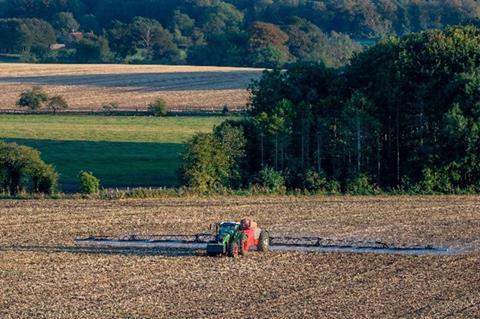A new campaign is urging public action to push the UK government to prioritise the reduction of “polluting” fossil fuel-based nitrogen fertilisers
The Soil Association has warned the UK government that its failure to act on fossil fuel-based fertilisers is putting the country’s whole Net Zero Strategy in jeopardy.
Soil Association head of farming policy Gareth Morgan commented: “It is shocking that the government’s Net Zero Strategy makes only a passing mention of the impact of fossil fuel-based fertilisers on the climate and environment and even more alarming that they have no plan in place to support farmers to reduce their reliance on them.”
A new campaign is urging the public to sign the ‘There’s no Net Zero without fixing fertiliser’ petition, calling for the government to put an immediate plan in place to cut fossil-fuel-based nitrogen fertilisers. The Soil Association said it was working with farming and environmental NGOs to establish an action group on nitrogen to press the government.

Not only is nitrogen a key contributor to climate change when released as nitrous oxide, which is 300 times more potent at warming the atmosphere than CO2, farmers’ reliance on “expensive and polluting” fossil fuels also makes them vulnerable to major price spikes and events like Russia’s invasion of Ukraine, Morgan said.
“Agriculture and the food system are responsible for a third of all greenhouse gas emissions and failing to address this will mean that the government has simply no prospect of meeting its net zero target,” he warned.
“It is vital that the government demonstrates its commitment to net zero by setting a target for reducing fossil fuel-based fertiliser in UK farming and offers incentives and advice to support farmers to reduce their dependence on nitrogen fertiliser and adopt cheaper, more nature friendly approaches to fix nitrogen on their farms.”
He said the experience of organic farmers could be used to steer the industry toward more nature-friendly farming practices.
“Organic farmers build natural fertility using nature friendly farming practices incorporating natural fertiliser, crops including legumes and clover in rotations, and a whole farm system approach,” Morgan explained. “This experience can help conventional farmers to reduce their reliance on costly inputs which will deliver significant benefits for the climate and biodiversity.”
Critical role
In defence of the role played by mineral fertilisers in agriculture, Jo Gilbertson, head of fertiliser at the Agricultural Industries Confederation (AIC), expressed some doubt over the large-scale shift to organic farming and stressed the efforts the sector was making toward decarbonisation.
“Mineral fertilisers play a critical role in food production as part of a range of necessary inputs, with these products supporting sustainable, resilient farm businesses,” he said. “The evidence clearly shows that a large-scale shift to organic farming practices would mean increased atmospheric and water pollution caused by expanding cropping areas by as much as 200 per cent to produce the same amount of food. This would also result in higher food costs and detrimentally impact the UK’s food security.
“The fertiliser sector is continually innovating to decarbonise manufacturing processes. New products, such as green ammonia-based nitrogen fertilisers and other low carbon footprint minerals, are in development and farmers are being encouraged to look at their nutrient use efficiency.”
Organic September
A survey by Soil Association Certification to coincide with Organic September found that 69 per cent of UK citizens are worried by recent evidence of climate change, but just a third are aware of fossil fuel-based fertilisers’ contribution to warming, air pollution, dying rivers and poor soil health.
According to the survey, two-thirds think agriculture should be a higher priority for all political parties, while three-quarters believe farmers need more support in producing food in harmony with nature.
“Our over-reliance on artificial fertilisers is contributing to air pollution, dying rivers, depleted soils and the rapidly warming climate,” said Morgan. “Emissions from fossil fuel-based nitrogen fertilisers are contributing to the climate emergency. This fossil fuel-reliant system has been a quick fix for producing more food but has come at a huge cost to nature, climate and human health.
“Organic standards ban the use of synthetic nitrogen fertilisers. Modelling, by French think tank IDDRI, suggests that if the whole of Europe switched to an organic or agroecological food and farming system combined with key dietary changes, we could see a 40 per cent drop in greenhouse gas emissions. Half of this drop would result from a cut in the use of fossil fuel-derived nitrogen fertiliser.”
The message of this year’s Organic September campaign is ‘Organic is climate action’. According to Soil Association, the campaign will urge the public to support organic by “making one small swap to organic” on their next visit to the shops.






